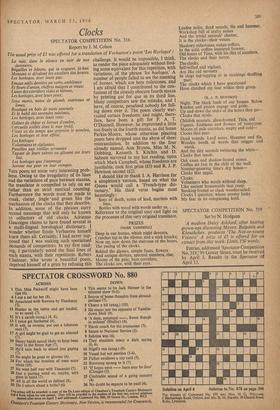Clocks
SPECTATOR COMPETITION No. 316 Report by J. M. Cohen La nuit, dans le silence en noir de nos demeures, Be quilles et batons, qui se cognent, la-bas: Montant et devalant les escaliers des .1teures. Les horloges, avec leurs pas: Emaux naïfs derriere un verre, emblemes Et fieurs d'antan. chi fires maigres et vieux: Lanes des corridors vides et blemes, Les horloges, avec leurs yeux; Sons morns, notes de plomb, marteaux et limes, Boutique en bois de mots sournois Et le babil des secondes minimes, Les horloges, avec leurs yob:: Gaines de chene et homes d'omhre, Cercuells scenes dans le mar froid, Vieux os du temps qua grignote le nombre, Les horloges et leer effroi: Les horloges Volontaires et vigilantes.
Pareilles aux vieilles servantes Tapant de !etas sabots oil glissant stir leurs bas, Les horloges que linterroge Serrent ma pear en lear compas.
Tuts poem set some very interesting prob- lems. Owing to the irregularity of its lines and the variations of pace between stanzas, the translator is compelled to rely on ear rather than on strict metrical counting. Furthermore the words must be made to creak, clatter, jingle 'and groan like the mechanism of the clocks that they describe. In addition, some of the phrases carry second meanings that will only be known to collectors of old clocks. Adrienne Gascoigne claims to have found several in a multi-lingual horological dictionary. I wonder whether Emile Verhaeren himself knew them all. Certainly, I had never sup- posed that I was making such specialised demands of competitors. In my first read- ing, I particularly noted the final lines of each stanza, with their repetitions. Robert ('haloner, who wrote a beautiful poem, deprived himself of a prize by refusing this
challenge. It would be impossible, I think, to render the piece adequately without find- ing some equivalent for this repetition, with variations, of the phrase 'les horloges.' A number of people failed to see the meaning of bornes, which are here milestones, and I am afraid that I contributed to the con- fusions of the already obscure fourth stanza by printing qui for que in its third line. Many competitors saw the mistake, and I have, of course, penalised nobody for fall- ing down over it. The poem clearly war- ranted certain freedoms, and might, there- fore, have been a gift for P. A. T. O'Donnell. However, he improvised a little too freely in the fourth stanza, as did Susan Parkin-Moore, whose otherwise pleasing poem here dropped into the abyss of sheer mistranslation. In addition to the four already named, Ann Bryson, Miss M. N. Dobbing, Kenneth S. Kitchin and D. Salmon survived to my last reading, upon which Mark Campbell, whose freedoms are justifiable, took first prize (£3) and R. J. P. Hewison second (i2).
I should like to thank I. A. Harrison for a simpleton's version, based on what the Goons would call a Trench-type dic- tionary.' His third verse begins most hauntingly : Sons of death, notes of lead, martinis with lime,
Bottles with wood with words under us. . . . Reference to the original may cast light on the processes of this very original translator.
PRIZES
(MARK CAMPBELL)
Deep in our homes, which night devours, Crutches tap in the silence, and a stick knocks; Now up, now down the staircase of the hours, The pacing of the clocks.
Behind the glasses, simple faces, flowers And antique devices, spectral numbers, rise; Moons of the pale, bare corridors, The clocks are, with their eyes. The usual prize of £5 was offered for a translation of Verhaeren's poem 'Les Horloges' : Leaden notes, dead sounds, file and hammer, Workshop full of crafty noises And the trivial seconds' chatter, It is the clocks-their voices.
Shadowy milestones, oaken coffers, In the cold, coffins immured forever, Old bones of Time, with his diet of numbers, The clocks and their terror.
The clocks, Self-willed and vigilant, Are like old servants In clogs tap-tapping or in stockings shuffling past; The clocks which I have questioned Have clutched my fear within their grasp.
(g. J. P. HEWISON) Night. The black hush of our houses. Below Ratchet and pinion engage and gride. Up and down the stairs of the hours they go- Clocks that stride.
Childish enamels, glass-fronted. Thin, old Figures. Emblems and flowers of yesteryear. Moons of pale corridors, empty and cold- Clocks that peer.
Dead sounds. Lead notes. Hammer and file. Wooden booth of words that snigger and sneak.
And the tiny seconds twittering the while- Clocks that speak.
Oak cases and shadow-bound stones. Coffins set fast in the chill of the wall. Number-gnawing time's dry bones- Clocks that appal.
Clocks.
Volunteers who watch without sleep. Like ancient housemaids that creep Stocking-footed or clack wooden-soled. Clocks I question, whose answer locks My fear in its compassing hold.


































 Previous page
Previous page